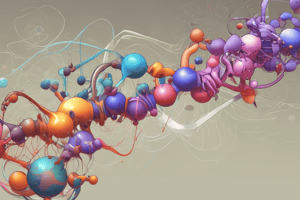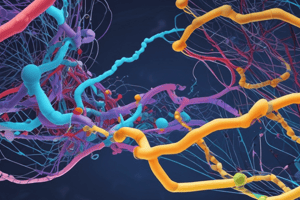Podcast
Questions and Answers
Enzymes are non-protein catalysts that increase the rate of reactions without being changed in the overall process.
Enzymes are non-protein catalysts that increase the rate of reactions without being changed in the overall process.
False (B)
The substrate of the reaction is indicated in the trivial name of an enzyme.
The substrate of the reaction is indicated in the trivial name of an enzyme.
False (B)
Enzymes have the suffix '-ase' in their recommended names.
Enzymes have the suffix '-ase' in their recommended names.
True (A)
Enzymes are classified into seven minor classes according to their reaction type.
Enzymes are classified into seven minor classes according to their reaction type.
The systematic name of an enzyme is based on the type of reaction it catalyzes.
The systematic name of an enzyme is based on the type of reaction it catalyzes.
Enzymes can catalyze reactions under extreme conditions of pH and temperature.
Enzymes can catalyze reactions under extreme conditions of pH and temperature.
Proteins can be broken down in a short period of time in the body due to enzymatic action.
Proteins can be broken down in a short period of time in the body due to enzymatic action.
The EC number of an enzyme is used to classify its substrate.
The EC number of an enzyme is used to classify its substrate.
Enzymes can be denatured by boiling for 24 hours in 20% HCl.
Enzymes can be denatured by boiling for 24 hours in 20% HCl.
Enzymes have a specific binding mechanism to their substrates.
Enzymes have a specific binding mechanism to their substrates.
Flashcards are hidden until you start studying



